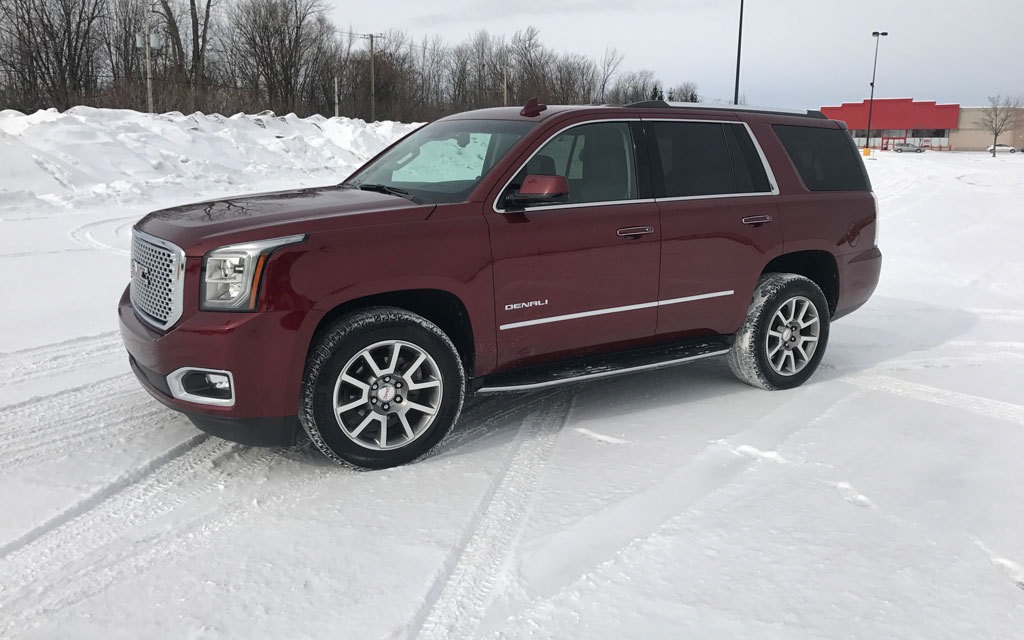2017 GMC Yukon Denali: Escalade Lite

| Strong points |
|
|---|---|
| Weak points |
|
If you’re in the market for a Cadillac Escalade, but cannot quite muster up the $90,000+ for a reasonably-equipped model, then you may have better luck with the GMC Yukon Denali which starts at $78,840. I characterize the Denali as an Escalade Lite, but as one of my auto journalist friends correctly pointed out, the Denali is essentially a full-on Escalade in terms of features. The only major differences are that the Denali comes with the GMC IntelliLink infotainment system (as opposed to Cadillac’s CUE) and the interior is a wee-bit less upscale (the last photo in the gallery is that of the Escalade for comparison).
The Denali vehicles represent GMC’s top-of-the-line versions. The name itself is derived from the tallest mountain in North America, located in Alaska. GMC has enjoyed much success with the branding since its introduction in 1999 and about 20% of all its sales are Denali trimmed vehicles.
It’s easy to see why, as the standard equipment list is long and exhaustive. The 2017 GMC Yukon Denali exterior sets itself apart with a special mesh-style grille, custom 20-inch wheels and HID headlights. The interior features navigation, a premium audio system with surround sound and comfortable leather seating in all three rows that envelop the occupants La-Z-Boy style.

Access to the third row is easy, thanks to the folding/tumbling middle-row captain’s chairs. Of particular interest to me were the power-folding third-row seats. The vehicle is so large that not having to climb halfway in in order to adjust the configuration is a huge plus. The black leather with white contrast stitching along with the wood trim makes for a nice contrast and reminds you this is a Denali. That being said, I didn’t find the layout of the controls very appealing aesthetically. Furthermore, most of these buttons and switches can be found in a base Chevrolet Impala.
The IntelliLink infotainment system is well designed and easy to use; however, some aspects like the two-second delay in switching between SiriusXM stations via the steering controls became annoying. Overall though, IntelliLink is above average in terms of ease of use compared to most other infotainment systems. The rear-seat entertainment system performed adequately, which is a relief of sorts. You see, most systems are so poorly designed that it makes operating them a highly frustrating endeavour. I’ve even seen some systems require the children themselves to press play from the rear seats in order to get the movie going. Fortunately, GM designers created a setup that is easily operable.
Powering the 2017 GMC Yukon Denali is a 6.2-litre EcoTec3 V8 engine, making 420 horsepower and 460 lb.-ft. of torque. The engine takes this boat to highway speeds in no time at all, and then transforms itself into a silent cruiser. The smoothness of the ride is quite remarkable, especially on Quebec’s pothole-laden roads, thanks to a magnetically adaptive suspension. On snow-covered back roads, things got a little slippery and two-wheel drive mode ceased to be a viable option. At the flip of a knob, the vehicle can be thrown into four-wheel drive and then snow becomes a non-issue. The downside here is fuel consumption. I averaged 17.0 L/100 km, which was expected, but it still stings no matter how you try to spin it.

The Yukon Denali’s modern styling, array of options, towing capacity, cargo space and people-hauling ability make it an attractive SUV for large families. There is also a market for people who need a big luxurious truck, but might not necessarily want or need the added prestige or profile that comes with the Cadillac badge. The massive road presence of the Yukon still strikes enough of a presence anywhere you go. The truck is huge and you’ll be hard pressed to manoeuvre around your local shopping centre parking lot.
The 2017 GMC Yukon Denali sits quite comfortably in the full-size luxury SUV segment and is among the more recently updated options. The current generation was released for the 2015 model year, so it’s still fairly recent in terms of design and should remain fresh for a while. Other competitors include the Ford Expedition, Lincoln Navigator, Nissan Armada, Infiniti QX80, Toyota Sequoia and Lexus LX.











